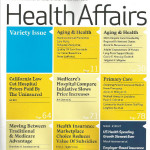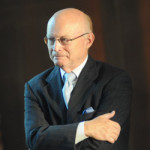 As the new year approaches, we look forward to the new grant projects that promise to make 2016 an exciting time for the John A. Hartford Foundation, our grantees, and colleagues who are all working to improve the care of older adults! We have so much to celebrate that has already been accomplished and the momentum going forward is palpable.
As the new year approaches, we look forward to the new grant projects that promise to make 2016 an exciting time for the John A. Hartford Foundation, our grantees, and colleagues who are all working to improve the care of older adults! We have so much to celebrate that has already been accomplished and the momentum going forward is palpable.
I am pleased to let you know that last week, our Trustees, led by Board Chair Peggy Wolff, approved five grants totaling $6.7 million. These projects, while focusing on a range of settings where older adults need improved care, all have several important features in common.
Whether it is the emergency department (ED), nursing homes, or in primary care, these projects will each utilize the deep knowledge of our John A. Hartford Foundation network of experts in the care of older adults. And while a single organization serves as our official grantee for each, they all will be successful because of strong collaboration among multiple organizations that share a commitment to creating large-scale change to meet the needs of older adults, their families, and our entire society.
 For example, in a research partnership with the West Health Institute, we are launching a Geriatric Emergency Department Collaborative that will improve the quality of care that older adults receive in EDs across the country. The American Geriatrics Society (AGS) will serve as our grantee, but the initiative is truly a joint effort between the funders, four national organizations (the American College of Emergency Physicians, the Society for Academic Emergency Medicine, the Emergency Nurses Association, and AGS), a learning collaborative of an initial nine health systems that will grow over time, and a cadre of passionate clinicians with expertise in ED care of older adults. We love the interdisciplinary nature of this collaborative effort and know we will learn much about how EDs can better serve older adults.
For example, in a research partnership with the West Health Institute, we are launching a Geriatric Emergency Department Collaborative that will improve the quality of care that older adults receive in EDs across the country. The American Geriatrics Society (AGS) will serve as our grantee, but the initiative is truly a joint effort between the funders, four national organizations (the American College of Emergency Physicians, the Society for Academic Emergency Medicine, the Emergency Nurses Association, and AGS), a learning collaborative of an initial nine health systems that will grow over time, and a cadre of passionate clinicians with expertise in ED care of older adults. We love the interdisciplinary nature of this collaborative effort and know we will learn much about how EDs can better serve older adults.
This important work further builds on Geriatric ED Guidelines developed by these passionate clinicians and a pilot Boot Camp program to help EDs implement quality improvement projects based on those guidelines. This two-year, first phase will also study the impact of guideline recommended care, set up an infrastructure for ongoing data collection and research, and develop a business plan for the expansion of the collaborative to 50 hospitals in a second grant-funded phase before becoming self-sustaining.
 In another exciting and collaborative project, we will be taking lessons learned from the highly effective hospital-based Nurses Improving Care for Healthsystems Elders (NICHE) model into nursing homes. NICHE was a dream in formation for me when I was at the Beth Israel Hospital in Boston in the early 1980s. With the support of this Foundation and guided by the wonderful work of the Hartford Institute for Geriatric Nursing at the New York University College of Nursing, the NICHE program has gone on to become self-sustaining and is helping more than 600 hospitals improve the care they deliver to older adults.
In another exciting and collaborative project, we will be taking lessons learned from the highly effective hospital-based Nurses Improving Care for Healthsystems Elders (NICHE) model into nursing homes. NICHE was a dream in formation for me when I was at the Beth Israel Hospital in Boston in the early 1980s. With the support of this Foundation and guided by the wonderful work of the Hartford Institute for Geriatric Nursing at the New York University College of Nursing, the NICHE program has gone on to become self-sustaining and is helping more than 600 hospitals improve the care they deliver to older adults.
I am thrilled to announce that the NICHE curricula, assessment tools, mentoring resources, and quality designation process will now support organizational change and improvement in long-term care facilities, starting with 225 nursing homes over the next three years. Like the hospital-based NICHE, this will become a self-sustaining enterprise that will help meet the country’s tremendous need for improvements in long-term care.
 Geriatric workforce development has long been the calling card of our Foundation. To help take the best practices in care of older adults from academic settings into primary care practices in the community, we will be partnering with the federal Health Resources and Services Administration (HRSA) to support a coordinating center for the new HRSA Geriatrics Workforce Enhancement Program.
Geriatric workforce development has long been the calling card of our Foundation. To help take the best practices in care of older adults from academic settings into primary care practices in the community, we will be partnering with the federal Health Resources and Services Administration (HRSA) to support a coordinating center for the new HRSA Geriatrics Workforce Enhancement Program.
The 44 sites selected to participate in the new HRSA program are partnerships between educational institutions and other clinical systems, which aim to transform how care is delivered, placing a strong emphasis on interprofessional teams and patient and family engagement. The Coordinating Center, housed at AGS, will facilitate collaborative learning, offer resources on geriatric education, provide mentoring with geriatrics experts, and conduct a national process evaluation to inform future federal programming.
 We certainly aim to influence policymakers and other decision makers who need tools and evidence to create policies that will best serve our aging society. A renewal of the John A. Hartford Foundation Aging & Health series in Health Affairs, the nation’s leading health policy journal, will help ensure that the highest-quality, aging-focused research and commentary gets into the hands of policymakers and health systems leaders.
We certainly aim to influence policymakers and other decision makers who need tools and evidence to create policies that will best serve our aging society. A renewal of the John A. Hartford Foundation Aging & Health series in Health Affairs, the nation’s leading health policy journal, will help ensure that the highest-quality, aging-focused research and commentary gets into the hands of policymakers and health systems leaders.
 Dr. John W. Rowe
Dr. John W. RoweFinally, in partnership with Dr. John W. Rowe at Columbia University and his pioneering work with the MacArthur Foundation’s Research Network on an Aging Society, we will be supporting the development of the John A. Hartford Aging Society Index. The evidence-based composite measure, or ‘index,’ will describe the capacity of countries to successfully adapt to the world’s aging population. It can serve both as a guide to the implementation of policies and a tool by which stakeholders can assess their effectiveness over time and across countries.
We are excited to be working in collaboration with all of the organizations and individuals involved in these projects. It is a heartening way to head into the new year, which will bring forward even more innovative grant projects that will dramatically improve the health and well-being of the older adults in our lives.
